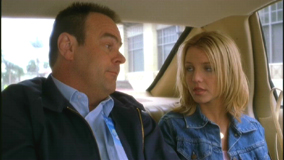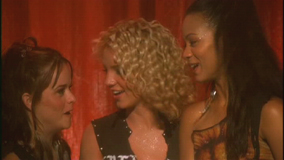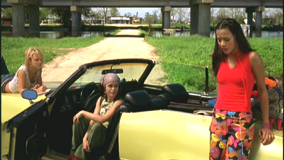Crossroads (Tamra Davis, 2002)
 Broaching the topics of artistic creativity and
self-definition with a level of symbolic intensity not seen in recent cinema
outside of Matthew Barney’s brilliant Cremaster
cycle, Tamra Davis’ virtuoso, vastly underrated epic Crossroads redefines the road movie by fitting it into the teen
flick genre, leaving an eminently approachable film that speaks to the core of
the modern American experience. At the start of the film, young Lucy Wagner
(tenderly played by musical artist Britney Spears) finds herself on the cusp of
adulthood, ready to graduate from high school. It is revealed that she has
drifted apart from her childhood friends as she has aged, resulting in a bookish
type of alienation in which she prepares for college and the inevitable march
toward consumerist culture. A seemingly eternal virgin and social outcast, she
is defined by her lack of connection with her peers and attempts to fill the
void by arranging a meaningless sexual roundelay with one of her classmates.
This initial mood of driftless teen angst recalls the films of Taiwanese masters
Tsai Ming-Liang and Hou Hsiao-Hsien, but Crossroads goes farther than any of their work in extrapolating
their themes.
Broaching the topics of artistic creativity and
self-definition with a level of symbolic intensity not seen in recent cinema
outside of Matthew Barney’s brilliant Cremaster
cycle, Tamra Davis’ virtuoso, vastly underrated epic Crossroads redefines the road movie by fitting it into the teen
flick genre, leaving an eminently approachable film that speaks to the core of
the modern American experience. At the start of the film, young Lucy Wagner
(tenderly played by musical artist Britney Spears) finds herself on the cusp of
adulthood, ready to graduate from high school. It is revealed that she has
drifted apart from her childhood friends as she has aged, resulting in a bookish
type of alienation in which she prepares for college and the inevitable march
toward consumerist culture. A seemingly eternal virgin and social outcast, she
is defined by her lack of connection with her peers and attempts to fill the
void by arranging a meaningless sexual roundelay with one of her classmates.
This initial mood of driftless teen angst recalls the films of Taiwanese masters
Tsai Ming-Liang and Hou Hsiao-Hsien, but Crossroads goes farther than any of their work in extrapolating
their themes.
 By the time Crossroads
reaches its deeply profound denouement, young Lucy has progressed to a point where she’s
entered adulthood to become a tragic, helpless Everyman (struck by the
frustrations imposed by her powerlessness, she solemnly sings, “I’m Not a
Girl, Not Yet a Woman.”). She cannot escape the looming threat of complacency,
which is why the climactic scene in the hotel room where she loses her virginity
pays homage to the hotel room scene in L'Avventura,
which similarly equates the onset of Eros with the march toward death. Through a
twist of fate that only further underlines the undercurrent about the haphazard
nature of fate that runs throughout the film, she enters a singing contest. Her
attempt to use the glitz of the competition to disguise the dearth of emotion
that she feels after her first sexual experience speaks of the way that we use
popular culture as a stopgap measure in preventing the realization that our
lives are meaningless. Like in the films of Chinese director Jia Zhange Ke, art
in Crossroads is in danger of becoming
a wholly owned subsidiary of commerce. Lucy’s hard-earned perspective,
delivered through her poetry and gained through the life experience earned on
her journey, becomes something to be judged by potential buyers. In this
context, her ability to create such gifted work becomes all the more valuable.
Clearly Lucy (Spears) is meant to represent the country’s need for
anti-establishment thought. Watching her arduous creative process, we understand
that the vast amount of time and effort that goes into her craft comes at the
expense of her ability to earn capital. When the girls’ car breaks down,
forcing them into a karaoke contest, a synergistic parallel between her ability
to create art and her desire to be a productive member of capitalist society is
formed, generating remarkable dramatic tension. Lucy proudly proclaims “I Love
Rock and Roll”, but one must question whether she truly loves the craft or is
being tempted by the salesmanship lurking behind it.
By the time Crossroads
reaches its deeply profound denouement, young Lucy has progressed to a point where she’s
entered adulthood to become a tragic, helpless Everyman (struck by the
frustrations imposed by her powerlessness, she solemnly sings, “I’m Not a
Girl, Not Yet a Woman.”). She cannot escape the looming threat of complacency,
which is why the climactic scene in the hotel room where she loses her virginity
pays homage to the hotel room scene in L'Avventura,
which similarly equates the onset of Eros with the march toward death. Through a
twist of fate that only further underlines the undercurrent about the haphazard
nature of fate that runs throughout the film, she enters a singing contest. Her
attempt to use the glitz of the competition to disguise the dearth of emotion
that she feels after her first sexual experience speaks of the way that we use
popular culture as a stopgap measure in preventing the realization that our
lives are meaningless. Like in the films of Chinese director Jia Zhange Ke, art
in Crossroads is in danger of becoming
a wholly owned subsidiary of commerce. Lucy’s hard-earned perspective,
delivered through her poetry and gained through the life experience earned on
her journey, becomes something to be judged by potential buyers. In this
context, her ability to create such gifted work becomes all the more valuable.
Clearly Lucy (Spears) is meant to represent the country’s need for
anti-establishment thought. Watching her arduous creative process, we understand
that the vast amount of time and effort that goes into her craft comes at the
expense of her ability to earn capital. When the girls’ car breaks down,
forcing them into a karaoke contest, a synergistic parallel between her ability
to create art and her desire to be a productive member of capitalist society is
formed, generating remarkable dramatic tension. Lucy proudly proclaims “I Love
Rock and Roll”, but one must question whether she truly loves the craft or is
being tempted by the salesmanship lurking behind it.
 Such political concerns are secondary to Crossroads’
truest intentions, however. The examination of the modern teen’s soul is the
film’s main subject matter, and nowhere is that made more apparent than in the
multifaceted allegory that places Lucy and her two compatriots in a decidedly
Biblical light. The three teen friends are meant to represent the father, son,
and Holy Ghost, but since Davis bravely switches their gender, she is making a
complex statement about the patriarchal society that the church exists in and
the ability of her heroines to challenge years of parentally imposed conformity.
Mimi (Taryn Manning), the pregnant teen, is obviously, the "father",
while Lucy, with her parental issues - which include her troubled relationship
with her father - is meant to be the "son". Kit (Zoe Saldana)
completes this chain as the "Holy Ghost", because she's black, which
naturally means she has soul. In every masterfully composed shot, the mise-en-scene
reveals the tension between these three and their environment. The struggle for genuine spiritual self-definition
using outmoded, sexist terms becomes these girls’ existential crisis. Each pit
stop they make along the way, whether at an antebellum hotel or a karaoke
concert (where they invoke America's folk heritage with their rendition of
"I Love Rock & Roll") is trying to show how the inescapable past
threatens to dictate the present and future. In crossing the nation to find a
mother who doesn't want her, Lucy’s struggle demonstrates the meaningless of
America's struggle toward self-awareness with only past archetypes to guide it.
Her quest for an uncaring mother becomes an allegory that encourages the
audience to challenge the specter of the past. When Lucy finally reconciles her
loss of her mother (and history), with the finale's stirring performance of
"I’m Not a Girl, Not Yet a Woman", she acknowledges the past's
influence on her while presenting an alternative to the endless cycle of
American ennui. Because of the intricacy of Crossroads’
structure, Lucy's twin song renderings support many meanings, both positive and
negative, for the girls and the audience. This seems appropriate given the
unyielding tentativeness found throughout each frame of this masterpiece.
Such political concerns are secondary to Crossroads’
truest intentions, however. The examination of the modern teen’s soul is the
film’s main subject matter, and nowhere is that made more apparent than in the
multifaceted allegory that places Lucy and her two compatriots in a decidedly
Biblical light. The three teen friends are meant to represent the father, son,
and Holy Ghost, but since Davis bravely switches their gender, she is making a
complex statement about the patriarchal society that the church exists in and
the ability of her heroines to challenge years of parentally imposed conformity.
Mimi (Taryn Manning), the pregnant teen, is obviously, the "father",
while Lucy, with her parental issues - which include her troubled relationship
with her father - is meant to be the "son". Kit (Zoe Saldana)
completes this chain as the "Holy Ghost", because she's black, which
naturally means she has soul. In every masterfully composed shot, the mise-en-scene
reveals the tension between these three and their environment. The struggle for genuine spiritual self-definition
using outmoded, sexist terms becomes these girls’ existential crisis. Each pit
stop they make along the way, whether at an antebellum hotel or a karaoke
concert (where they invoke America's folk heritage with their rendition of
"I Love Rock & Roll") is trying to show how the inescapable past
threatens to dictate the present and future. In crossing the nation to find a
mother who doesn't want her, Lucy’s struggle demonstrates the meaningless of
America's struggle toward self-awareness with only past archetypes to guide it.
Her quest for an uncaring mother becomes an allegory that encourages the
audience to challenge the specter of the past. When Lucy finally reconciles her
loss of her mother (and history), with the finale's stirring performance of
"I’m Not a Girl, Not Yet a Woman", she acknowledges the past's
influence on her while presenting an alternative to the endless cycle of
American ennui. Because of the intricacy of Crossroads’
structure, Lucy's twin song renderings support many meanings, both positive and
negative, for the girls and the audience. This seems appropriate given the
unyielding tentativeness found throughout each frame of this masterpiece.
* * * * Masterpiece
04-01-03
Jeremy Heilman